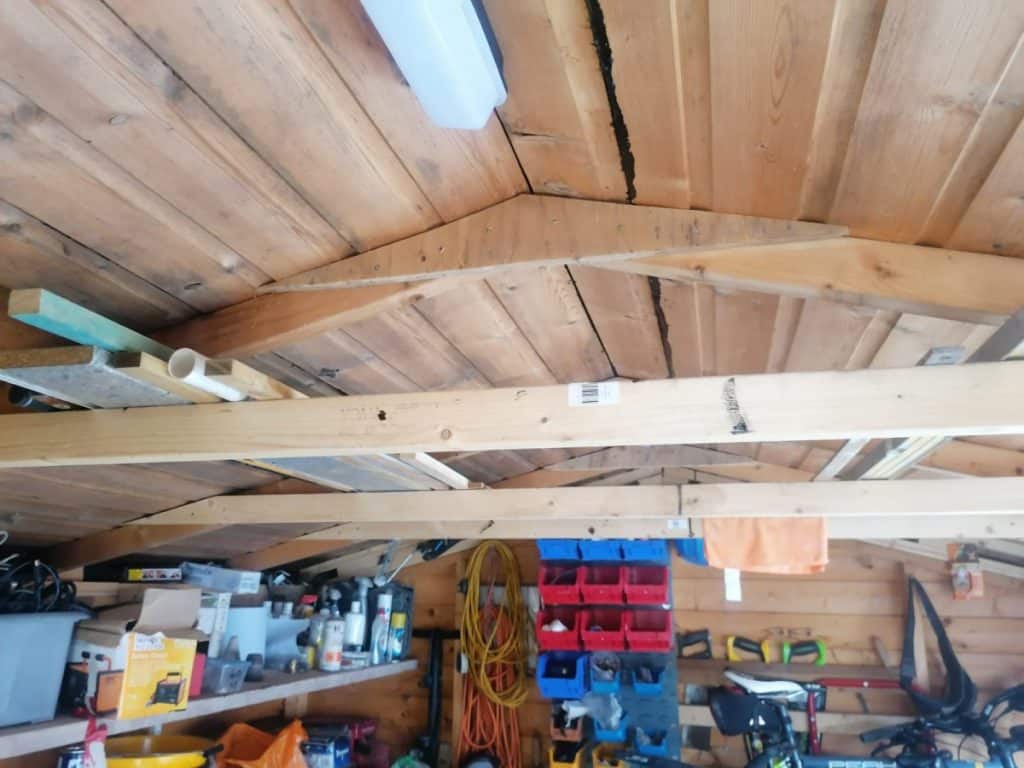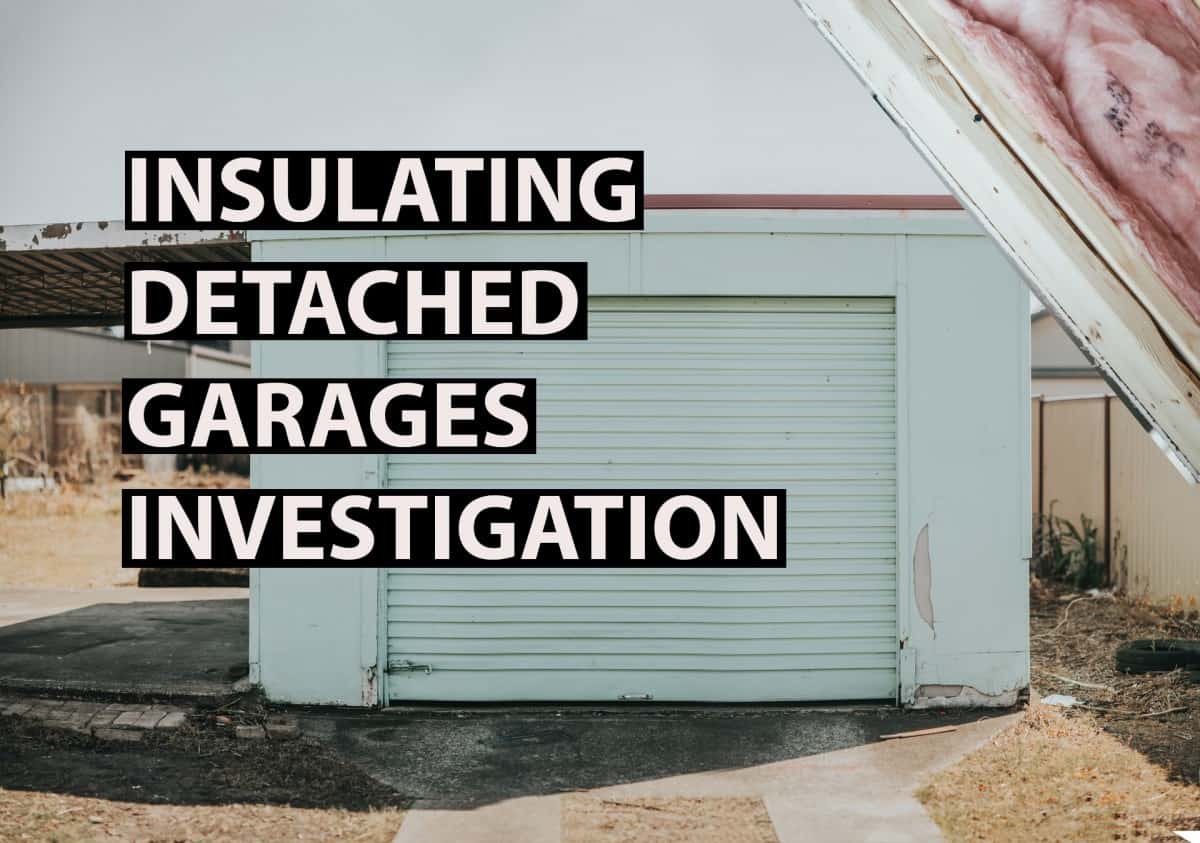The rules for insulating a detached garage vs an integrated garage don’t differ too much. However that being said. There are a few extra things to consider and a few options available to detached garage owners that aren’t available to integrated garage owners. We’ll explore them both in this article.
Should I Insulate My Detached Garage? Yes, you absolutely should. Insulating your garage can be thought of as an investment that will pay for itself over time. Especially taking into account the reduced costs attributed to lower utility bills.
I’m fortunate enough to have owned a house that comes with its own detached two car garage. My wife parks her Chevi Volt in there and I use the extra space as a makeshift home gym. We live in Minnesota so the winters can get real cold here so I was looking to insulate my garage to provide a little warmth during my home workout and when me or my wife are doing the laundry in there.
During my research I discovered that there’s a few extra things to consider when insulating a detached garage vs an integrated garage. Keep reading and I’ll walk you through some of the decisions I went through and will hopefully guide you if you’re thinking about insulating your garage.
What are the pros and cons of insulating your garage?
I’ve summed up some of the points I’ll make further in the article in case you just want the cliff notes, or want to refer back to this after at a later date.
- Insulation makes your garage cooler in the summer
- Insulation keeps your garage warmer in the winter
- Insulation can reduce your heating bills
- Insulation can reduce your air conditioning bills
- Lower initial costs for buying a air conditioning unit
- Sound dampening and more quiet
So now you know the major points, lets dive into the gotchas that I think people sometimes overlook when they consider insulating a detached garage.
Garages without insulation are still warm!

There’s a misconception that without insulation your garage will be freezing cold during the winter. While there is some definite truth in this. You’ll still get a little higher temperatures compared to the ambient outside temperature. Plus if you take into account the lack of wind chill on a windy day because you’re well inside! Then you start to see why a garage without any purposely installed insulation can still make sense.
For instance my wifes car parked in the garage doesn’t need scraping ice off its windshield during winter. The garage is good enough to keep the freezing cold temperatures at bay.
So if you’re thinking of installing insulation for this reason alone, unless you’re living in Northern Alaska you probably won’t need to.
If you’re interested in learning about how best to insulate your garage ceiling check out our article on Should I Insulate My Garage Ceiling?
Detached Garages can be Externally Insulated
This blew my mind when I found it. But now I think about it, it’s obvious! Because a detached garage has all 3 sides (minus the door and the roof) exposed. You could wrap the exterior of the building in insulation instead of doing it in the interior.
There’s a coupe of benefits of this approach that might make it your go to option. The first being that you can insulate the garage without loosing interior space. Let me explain, when you install insulation in your garage you inevitably loose some interior space. This is because the insulation itself takes up room. With higher rated types taking up even more room. For instance an Owens Corning insulation with an R rating of R-19 can be 15 inches thick. Times that by 2 and you’re losing potentially 30 inches of interior space. Not to mention if you cover it with sheet rock!
So there’s a definite benefit in that regard to moving your insulation to the exterior of the garage.
The next not so obvious point is you can combine the exterior insulation with cladding to improve the weather resistance of the garage. Since you’ve effectively added a outer shell to the building. This could add years to the life of the garage and reduce maintenance costs.
What about safety concerns?
This is something I overlooked initially as I hadn’t considered it. One of the things to take into account when you do a good job of insulating a garage is that you are pretty much making the whole building more air tight. This is a good thing in the context of keeping heat in. But a bad think when you consider ventilating fumes.
What kind of fumes?
Well the obvious one I can think of is when you drive your car in there and leave the motor running. The gases from the tailpipe are dangerous if you allow them to collect in an enclosed area. That’s all to easily done if you lower the garage door after you’ve parked up and leave it running for a while.
The other not so obvious one is fumes from things like paint or other hardware supplies you might have hanging around in your garage. While they wouldn’t be dangerous on their own. If you allowed them to accumulate over days, weeks and months they could pose a pretty serious risk.

Invest in an air conditioning unit
It seems obvious to say but this is totally worth doing for a whole number of reasons, not to mention safety. If you install an AC then you can quickly ventilate any gases that might have accumulated in the garage.
The other thing to do is to get into the habit of not turning on the garage if the garage door is closed. Simple right? Or just leaving a window open if you happen to have one.
Internal Ambient Heat
OK, I’ve just listed a few dangers but on the flip side there are a some definite positives of parking your car into a well insulated garage. The first being that the engine heat alone can warm up the garage. That’s great! You won’t need to leave the car running. The engine block will retain a bunch of heat from being previously driven.
And if your use case for you garage is drive in and out, do the laundry, offload groceries and other light uses then you’ll probably not need to invest in any heating at all!
That’s great for the winter but not so great if it’s a hot summers day. I mean that last think you want is a piping hot engine block seeping out warmth into your already well insulated garage. That doesn’t sound too good at all.
That’s where my recommendation to install an air conditioning unit makes total sense. Keep in mind if you were to install AC for a garage that is attached to your house then DON’T fall into the trap of tapping into your houses air conditioning system. This is because you can potentialy cause a low pressure zone as you wouldn’t want to recirculate the air from the garage into the rest of the house.
Remember what I said about safety and fumes. Well you’d effectively be circulating those fumes around the rest of your house!
Fortunately this isn’t an issue for detached garages by their very nature. Just make sure you don’t underestimate the size of cooler you’ll need to properly cool your garage. The last thing you want to find out is that the cooler you brought back in Fall isn’t going to cut it in the height of summer.
In our article on Insulating garages (of all types) we cover the best ways to heat your garage.
Garage Home Offices
One thing to consider if you have a home office in your garage is how to make it a comfortable climate. Especially if you’re office office is in the attic space of the garage. This setup is pretty common for people who work from home and want a clear separation between house and work.
If you don’t have sufficient insulation and cooling installed then these types of setups can get unbearably hot in the summer and freezing cold in the winter. In this scenario I absolutely would invest in high quality insulation and a top notch air conditioning unit that blows hot and cold to keep you at a comfortable temperature all year round.
Conclusion
It’s a great priveledge to own a detached garage. They offer some many possiblities for different use cases. If you’re garage doesn’t have insulation then it’s definitely worth investigating if it’s worth installing it. Speak to your local contractor and they’ll give you an idea as to what the costs will be.
I hope you enjoyed reading this article, if you found it useful then share it with other people who might be interested in learning more about detached garage door insulation!
Steve

